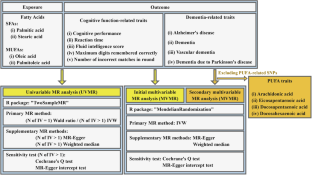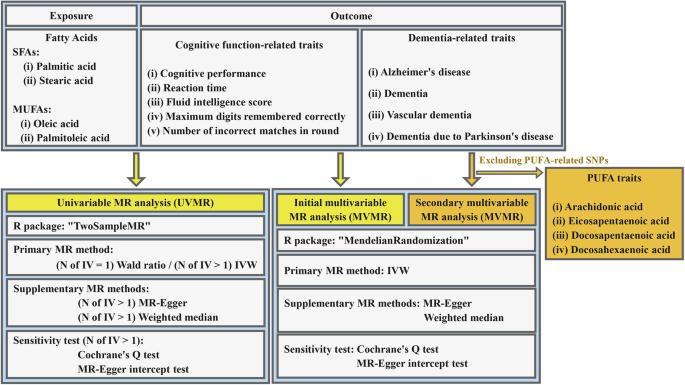饱和脂肪酸和单不饱和脂肪酸对认知障碍的影响:孟德尔随机研究的证据
IF 3.6
3区 医学
Q2 NUTRITION & DIETETICS
引用次数: 0
摘要
背景先前的观察性研究表明,饱和脂肪酸(SFA)和单不饱和脂肪酸(MUFA)与认知功能之间存在相关性。方法我们通过单变量孟德尔随机化(UVMR)和多变量孟德尔随机化(MVMR)分析评估了两种 SFA(棕榈酸 [PA] 和硬脂酸 [SA])和两种 MUFA(油酸 [OA] 和棕榈油酸 [POA])对认知功能相关特征和痴呆症相关特征的因果影响。结果 UVMR 表明,OA 水平每增加一个标准差,认知表现得分的 β 值为 0.060(P = 4.05E-06),流体智力的 β 值为 0.066(P = 4.21E-04)。MVMR显示:(i) POA每增加一个标准差,流体智力得分的β值为-0.608 (P = 8.37E-05);(ii) OA每增加一个标准差,流体智力得分的β值为0.074 (P = 0.018);(iii) PA每增加一个标准差,回合错误匹配次数的β值为0.029 (P = 0.033);(iv) SA每增加一个标准差,回合错误匹配次数的β值为0.039 (P = 0.032)。此外,在剔除多不饱和脂肪酸的影响后,二次 MVMR 分析表明(结论总体而言,UVMR 和 MVMR 表明 OA 可能对认知功能有益,而 POA、PA 和 SA 可能对认知功能有害。本文章由计算机程序翻译,如有差异,请以英文原文为准。


Effects of saturated and monounsaturated fatty acids on cognitive impairment: evidence from Mendelian randomization study
Prior observational studies have suggested correlations between saturated fatty acids (SFAs) and monounsaturated fatty acids (MUFAs) with cognitive function. However, causal relationships remains unclear. We assessed the causal impact of two SFAs (palmitic acid [PA] and stearic acid [SA]) and two MUFAs (oleic acid [OA] and palmitoleic acid [POA]) on cognitive function-related traits, and dementia-related traits by univariable Mendelian randomization (UVMR) and multivariable Mendelian randomization (MVMR) analyses. UVMR indicated β of 0.060 (P = 4.05E−06) for cognitive performance score and 0.066 (P = 4.21E−04) for fluid intelligence per standard deviation (SD) increase in OA level. MVMR indicated: (i) β of −0.608 (P = 8.37E−05) for fluid intelligence score per SD increase in POA; (ii) β of 0.074 (P = 0.018) for fluid intelligence score per SD increase in OA; (iii) β of 0.029 (P = 0.033) for number of incorrect matches in round per SD increase in PA; and (iv) β of 0.039 (P = 0.032) for number of incorrect matches in round per SD increase in SA. In addition, a secondary MVMR analysis after excluding the effect of polyunsaturated fatty acids suggested that: (i) β of −0.043 (P = 1.97E−02) for cognitive performance score per SD increase in PA and (ii) β of −0.079 (P = 1.79E−03) for cognitive performance score per SD increase in SA. Overall, UVMR and MVMR suggest that OA may be beneficial for cognitive function, while POA, PA, and SA may have detrimental effects on cognitive function.
求助全文
通过发布文献求助,成功后即可免费获取论文全文。
去求助
来源期刊
CiteScore
10.60
自引率
2.10%
发文量
189
审稿时长
3-6 weeks
期刊介绍:
The European Journal of Clinical Nutrition (EJCN) is an international, peer-reviewed journal covering all aspects of human and clinical nutrition. The journal welcomes original research, reviews, case reports and brief communications based on clinical, metabolic and epidemiological studies that describe methodologies, mechanisms, associations and benefits of nutritional interventions for clinical disease and health promotion.
Topics of interest include but are not limited to:
Nutrition and Health (including climate and ecological aspects)
Metabolism & Metabolomics
Genomics and personalized strategies in nutrition
Nutrition during the early life cycle
Health issues and nutrition in the elderly
Phenotyping in clinical nutrition
Nutrition in acute and chronic diseases
The double burden of ''malnutrition'': Under-nutrition and Obesity
Prevention of Non Communicable Diseases (NCD)

 求助内容:
求助内容: 应助结果提醒方式:
应助结果提醒方式:


